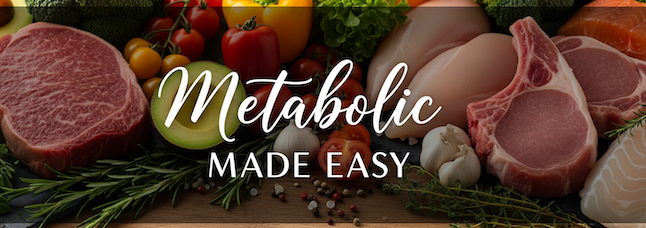Weight Loss
A metabolic approach to weight loss focuses on optimizing your body’s natural ability to burn fat, balance energy, and maintain long-term health—without extreme dieting or unsustainable habits.
This page outlines the benefits, tools, resources, and strategies that make metabolic weight loss effective for a wide range of individuals and goals.
Why Most Diets Fail
Most conventional weight loss diets rely on extreme calorie restriction, rigid rules, or “quick fixes” that often lead to:
- Loss of lean muscle mass
- Slowed metabolism
- Rebound weight gain
- Cravings and fatigue
- Emotional burnout
The Metabolic Difference
A metabolic approach focuses on:
- Preserving lean muscle
- Supporting hormonal balance
- Reducing inflammation
- Improving insulin sensitivity
- Enhancing mitochondrial function (your body’s energy production)
Benefits of a Metabolic Weight Loss Approach
- Sustainable fat loss
- Reduced cravings and hunger
- Improved energy and mood
- Balanced hormones
- Better sleep and mental clarity
- Long-term weight maintenance
Weight Loss Goals: One Size Doesn’t Fit All
Common Weight Loss Goals
- Fat Loss: Targeting visceral fat while maintaining muscle
- Body Recomposition: Losing fat while gaining muscle
- Metabolic Reset: Healing metabolism post-diet or after weight gain
- Hormonal Balance: Weight loss related to thyroid, PCOS, or menopause
- Chronic Condition Support: Diabetes, hypertension, or fatty liver disease
Common Weight Loss Diets: Benefits and Risks
| Diet | Benefits | Risks / Challenges |
|---|---|---|
| Low-Carb / Keto | Rapid fat loss, reduced insulin levels, appetite control | Can cause fatigue or keto flu initially |
| Paleo | Whole foods, anti-inflammatory | Can be high in cost, may lack carbs for athletes |
| Intermittent Fasting (IF) | Improved insulin sensitivity, cellular repair | Can be hard to sustain; not for everyone |
| Mediterranean | Heart-healthy, plant-rich, sustainable | Slower weight loss |
| Calorie Counting (CICO) | Simple tracking | Ignores food quality, hunger signals |
| Plant-Based | High in fiber and nutrients | Risk of low protein intake, may not be satiating |
Why Metabolic Weight Loss Works
“Weight loss is not about eating less and moving more—it’s about eating and moving in ways that restore hormonal balance, support metabolism, and reduce inflammation.”
— Dr. Jade Teta, Metabolic Health Expert
Metabolic weight loss focuses on quality over quantity. It helps retrain the body to rely on fat for fuel, build lean mass, and develop habits that prevent rebound weight gain.
Coaching: A Key to Success
Metabolic coaching combines science-backed protocols with accountability and personalization. Coaches help with:
- Custom meal planning
- Behavior and habit change
- Tracking metrics and adjusting protocols
- Mindset and motivation support
Many programs offer both individual coaching and group support to enhance accountability and education.
What a Typical Day Looks Like (Metabolic Weight Loss)
Here’s a sample day for someone following a metabolic weight loss plan:
Morning
- Wake-Up Routine: Hydration with electrolytes, sunlight exposure, light movement
- Mindset Practice: Journaling or meditation (5–10 mins)
- Movement: Fasted walk or light strength training (20–30 mins)
- Breakfast (optional or after movement): High-protein meal (e.g., eggs, avocado, greens)
Midday
- Meal: Protein + fiber-rich vegetables + healthy fat (e.g., grilled chicken, broccoli, olive oil)
- Hydration: Continue water or herbal tea intake
- Work Break: Movement break or deep breathing
Afternoon
- Snack (if needed): Hard-boiled egg, nuts, protein shake
- Movement: Walk or short stretch
- Mindset: Gratitude check-in or short break for reflection
Evening
- Dinner: Salmon, roasted veggies, and leafy greens
- Screen-Free Wind Down: 30 mins before bed
- Sleep Routine: Magnesium, blackout curtains, consistent bedtime
Movement Guidelines by Goal
| Goal | Type of Movement | Frequency |
|---|---|---|
| Fat Loss | Walking, strength training, mobility | Daily walking + 3x/week strength |
| Muscle Gain | Progressive resistance training | 4–5x/week |
| Hormonal Balance | Gentle movement, restorative yoga | 3–4x/week |
| Postpartum or Injury | Mobility, light strength, core rehab | 3x/week with supervision |
Recommended Resources (Click to Visit)
- Metabolic Renewal by Dr. Jade Teta
- The Obesity Code by Dr. Jason Fung
- Precision Nutrition Weight Loss Guide
Downloadable PDFs for Your Journey
- 📄 Metabolic Weight Loss Starter Guide (PDF)
- 📄 Meal Planning Template (PDF)
- 📄 Mindset + Habit Tracker (PDF)
Quotes from Experts
“Insulin resistance is at the heart of most modern weight problems. A metabolic strategy addresses the root cause—not just the symptom.”
— Dr. Benjamin Bikman, Author of ‘Why We Get Sick’
“The key to sustainable weight loss is restoring the brain-body connection—learning to fuel, not starve.”
— Cynthia Thurlow, NP, IF Expert
Final Thoughts
Metabolic weight loss is not a crash diet—it’s a re-alignment with how your body is built to function. Whether you’ve struggled with dieting in the past or want to take a root-cause approach, this method offers tools, flexibility, and results.
Let this be the last “diet” you ever start—because it’s a lifestyle built for your biology.
